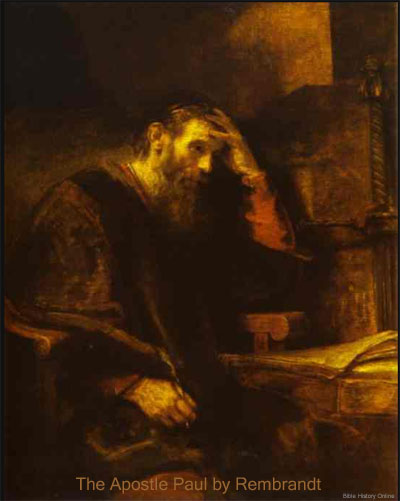Colossians 2:18 Let no man beguile you of your reward in a voluntary humility and worshipping of angels, intruding into those things which he hath not seen, vainly puffed up by his fleshly mind, - Free Bible Online
Colossians 2:18 Let no one keep defrauding you of your prize by delighting in self-abasement and the worship of the angels, taking his stand on [visions] he has seen, inflated without cause by his fleshly mind,
18. beguile--Translate, "Defraud you of your prize," literally, "to
adjudge a prize out of hostility away from him who deserves it"
[TRENCH]. "To be umpire in a contest to the detriment of one." This
defrauding of their prize the Colossians would suffer, by letting
any self-constituted arbitrator or judge (that is, false
teacher) draw them away from Christ," the righteous Judge" and Awarder
of the prize
(2Ti 4:8;
Jas 1:12;
1Pe 5:4),
to angel-worship.
in a voluntary humility--So "will-worship"
(Col 2:23).
Literally, "Delighting ([WAHL]) in humility";
loving (so the Greek is translated,
Mr 12:38,
"love to go in long clothing") to indulge himself in a
humility of his own imposing: a volunteer in humility
[DALLÆUS]. Not as ALFORD, "Let no one of purpose defraud you," &c.
Not as GROTIUS, "If he ever so much wish" (to
defraud you). For the participle "wishing" or "delighting," is one of
the series, and stands in the same category as "intruding," "puffed
up," "not holding"; and the self-pleasing implied in it stands
in happy contrast to the (mock) humility with which it seems to
me, therefore, to be connected. His "humility," so called, is a
pleasing of self: thus it stands in parallelism to "his fleshly
mind" (its real name, though he styles it "humility"), as
"wishing" or "delighting" does to "puffed up." The Greek for
"humility" is literally, "lowliness of mind," which forms a
clearer parallel to "puffed up by his fleshly mind." Under
pretext of humility, as if they durst not come directly to God and
Christ (like the modern Church of Rome), they invoked angels: as
Judaizers, they justified this on the ground that the law was given by
angels. This error continued long in Phrygia (where Colosse and
Laodicea were), so that the Council of Laodicea (A.D. 360) expressly framed its thirty-fifth canon
against the "Angelici" (as AUGUSTINE
[Heresies, 39], calls them) or "invokers of angels." Even as
late as THEODORET'S time, there were oratories to
Michael the archangel. The modern Greeks have a legend that Michael
opened a chasm to draw off an inundation threatening the Colossian
Christians. Once men admit the inferior powers to share invocation with
the Supreme, the former gradually engrosses all our serious worship,
almost to the exclusion of the latter; thus the heathen, beginning with
adding the worship of other deities to that of the Supreme, ended with
ceasing to worship Him at all. Nor does it signify much, whether we
regard such as directly controlling us (the pagan view), or as only
influencing the Supreme in our behalf (the Church of Rome's
view); because he from whom I expect happiness or misery, becomes the
uppermost object in my mind, whether he give, or only
procure it [Cautions for Times]. Scripture opposes the
idea of "patrons" or "intercessors"
(1Ti 2:5, 6).
True Christian humility joins consciousness of utter personal demerit,
with a sense of participation in the divine life through Christ, and in
the dignity of our adoption by God. Without the latter being realized,
a false self-humiliation results, which displays itself in ceremonies
and ascetic self-abasement
(Col 2:23),
which after all is but spiritual pride under the mock guise of
humility. Contrast "glorying in the Lord"
(1Co 1:31).
intruding into . . . things which he hath not seen--So very old
manuscripts and Vulgate and
ORIGEN read. But the oldest manuscripts
and LUCIFER omit "not"; then translate, "haughtily treading on
('Standing on'
[ALFORD]) the things which he hath seen."
TREGELLES
refers this to fancied visions of angels. But if Paul had meant a
fancied seeing, he would have used some qualifying word, as, "which
he seemed to see," not "which he hath seen." Plainly the things
were actually seen by him, whether of demoniacal origination
(1Sa 28:11-20),
or phenomena resulting from natural causation, mistaken by him as if
supernatural. Paul, not stopping to discuss the nature of the things so
seen, fixes on the radical error, the tendency of such a one in all
this to walk by SENSE (namely, what he
haughtily prides himself on having SEEN),
rather than by FAITH in the UNSEEN "Head"
(Col 2:19;
compare
Joh 20:29;
2Co 5:7;
Heb 11:1).
Thus is the parallelism, "vainly puffed up" answers to "haughtily
treading on," or "setting his foot on"; "his fleshly mind" answers to
the things which he hath seen," since his fleshliness betrays itself in
priding himself on what he hath seen, rather than on the
unseen objects of faith. That the things seen may have
been of demoniacal origination, appears from
1Ti 4:1,
"Some shall depart from the faith, giving heed to seducing
spirits and doctrines of devils" (Greek, "demons"). A warning to
modern spiritualists.
puffed up--implying that the previous so called "humility" (Greek, "lowliness of mind") was really a "puffing up."
fleshly mind--Greek, "By the mind of his own flesh." The flesh,
or sensuous principle, is the fountain head whence his mind draws its
craving after religious objects of sight, instead of, in true
humility as a member, "holding fast the (unseen) Head."
JFB.
Questions Related to this Verse
Select a Chapter
Select a Book of the Bible
-
Genesis |
Exodus |
Leviticus |
Numbers |
Deuteronomy |
Joshua |
Judges |
Ruth |
1 Samuel |
2 Samuel |
1 Kings |
2 Kings |
1 Chronicles |
2 Chronicles |
Ezra |
Nehemiah |
Esther |
Job |
Psalms |
Proverbs |
Ecclesiastes |
Song of Solomon |
Isaiah |
Jeremiah |
Lamentations |
Ezekiel |
Daniel |
Hosea |
Joel |
Amos |
Obadiah |
Jonah |
Micah |
Nahum |
Habakkuk |
Zephaniah |
Haggai |
Zechariah |
Malachi |
Matthew |
Mark |
Luke |
John |
Acts |
Romans |
1 Corinthians |
2 Corinthians |
Galatians |
Ephesians |
Philippians |
Colossians |
1 Thessalonians |
2 Thessalonians |
1 Timothy |
2 Timothy |
Titus |
Philemon |
Hebrews |
James |
1 Peter |
2 Peter |
1 John |
2 John |
3 John |
Jude |
Revelation |
The Book of Colossians
Colossians 1:16 - For by him were all things created, that are in heaven, and that are in earth, visible and invisible, whether [they be] thrones, or dominions, or principalities, or powers: all things were created by him, and for him:
Colossians 2:15-17 - [And] having spoiled principalities and powers, he made a shew of them openly, triumphing over them in it. Let no man therefore judge you in meat, or in drink, or in respect of an holyday, or of the new moon, or of the sabbath [days]: Which are a shadow of things to come; but the body [is] of Christ.
Colossians in The New Testament - A Brief Overview

Painting of Paul the Apostle by Rembrandt - 1657
Introduction to The Book of Colossians
Brief Summary. Paul had been imprisoned at Rome and received messages about heresies at the church in Colossae. Paul defended the faith by exalting the person of Jesus, and clarifying the true doctrine of Jesus Christ.
Summary of The Book of ColossiansPurpose. The purpose of Paul's epistle to the Colossians is to instruct the believers that salvation is only in Jesus Christ. The person of Jesus Christ must be understood accurately and that "He is the image of the invisible God and in Him all the fulness of the Godhead dwells in bodily form (Colossians 1:15, 19). When Jesus died on the cross he put an end to the civil and ceremonial laws of Judaism. Believers can trust in the finished work of Jesus Christ, our God and creator.
Contents. The epistle to the Colossians contains Paul's instruction about the new life in Christ which comes through a spiritual union with Christ in heaven. This new life produces a Christlike character: brotherly affection, forgiveness, peace, worship and ministry, devotion to Christ, and thankfulness in everything.
Colossae. The city of Colossae was in the heart of New Testament Asia about a hundred miles east of Ephesus, in the Lycus River Valley, in southern Phrygia Colossae was situated on the great highway which ran from Ephesus to the Euphrates Valley, near Hierapolis and Laodicea. According to Colossians 4:12-15 the church had been established in Colossae some time earlier and was Paul sternly warns the church regarding angel-worship, especially that of Michael the Archangel.
The Church at Colossae. Paul does not name himself as the founder of the church at Colossae, yet since he passed through the region of Phrygia (Acts 16:6; 18:23) which the city of Colossae was a part of, it may be assumed that Paul came there and preached Christianity.
The Heresy. The Church at Colossae was being severely attacked by false teachers. The heresy contained many false teachings which included: a false view of the universe, matter is evil, a distortion of man, sin is physical not spiritual, abstaining from foods and asceticism, a misunderstanding of the person of Jesus Christ and the Logos, the worship of angels, and elements of Judaism mixed with Christianity.
Authorship. The epistle to the Colossians was written by Paul the Apostle and included with his prison epistles.
Date. Colossians was written from Rome during Paul's first imprisonment, about 61-62 AD.
Outline of the Book of Colossians
Jesus Christ Exalted - Chapter 1
Christianity Exalted - Chapters 2
Union with Christ Exalted - Chapter 3-4

The Name Jesus In Ancient Hebrew Text
"Yeshua" in First Century Hebrew Text. This is how the name "Jesus"
would have been written in ancient Hebrew documents. The four letters or
consonants from right to left are Yod, Shin, Vav, Ayin (Y, SH, OO, A).
Jesus is the Greek name for the Hebrew name Joshua or Y'shua which means
"The LORD or Yahweh is Salvation".
Colossians Maps and Resources
Map of the Roman Empire (14 A.D.) - This map reveals the Roman Empire during the time shortly after the birth of Jesus, in 14 AD at the time of the death of Augustus. The order which prevailed in this extensive empire, the good military roads, and the use of Koine Greek as the general language of culture throughout the area were among the factors which multiplied the rapid spread of the Gospel of Jesus Christ. (Color Map)
Map of Paul's First Missionary Journey (48 A.D.) - This map reveals the areas in Asia Minor where Paul visited in his first missionary journey. Around 48 AD, in the springtime, Paul and his companions Barnabas and Mark were sent on a mission from the church in Antioch. This would be the first of Paul's Missionary Journey's. (Color Map)
Map of Paul's Second Missionary Journey (51 A.D.) - This map reveals the areas in Asia and Greece where Paul visited in his second missionary journey. Paul re-visits a couple cities in Asia, one of which was Lystra where he was stoned and left for dead a few years earlier. He later has a vision that leads him over to Greece and Paul and his companions travel and minister in various cities in Greece (Philippi, Thessalonica, Berea, Athens and Corinth. Later Paul returns to Ephesus and finally to Caesarea and Antioch. (Color Map)
Map of Paul's Third Missionary Journey (54 A.D.) - This map reveals the areas in Asia and Greece where Paul visited in his third missionary journey. On Paul's third missionary journey he returned to the cities he had first visited on his first missionary journey. During this time he decided to remain in Ephesus for about 3 years, and this city was the main focus of his activities and an important Christian community (Acts 19). (Color Map)
Map of the New Testament World - This map reveals the "Nations" within the ancient world during the first century A.D., the time of the New Testament. The map includes the areas of Israel, Asia, Greece, and Italy. (Color Map)
Map of New Testament Asia - This map shows the cities within
Asia Minor during the first century A.D., the time of the New
Testament. The map includes the principal cities of Asia
including Tarsus, Ephesus, and Colossae, and provinces like
Galatia and Pamphilia. (Color Map)
Bibliography Information
Free Bible Online Picture Study Bible, King James Version. New York: American Bible Society: www.free-bible.com, 1995-2013. Bible History Picture Study Bible. May 09, 2024.
- King James Bible Home
- Free Bible Home Page
- Bible Encyclopedia (ISBE)
- Online Bible (KJV)
- Naves Topical Bible
- Smith's Bible Dictionary
- Easton's Bible Dictionary
- Fausset's Bible Dictionary
- Matthew Henry Bible Commentary
- Hitchcock's Bible Dictionary
Read The Bible
- 1599 Geneva Bible (GNV)
- 21st Century King James Version (KJ21)
- American Standard Version (ASV)
- Amplified Bible (AMP)
- Amplified Bible, Classic Edition (AMPC)
- Authorized (King James) Version (AKJV)
- BRG Bible (BRG)
- Christian Standard Bible (CSB)
- Common English Bible (CEB)
- Complete Jewish Bible (CJB)
- Contemporary English Version (CEV)
- Darby Translation (DARBY)
- Disciples’ Literal New Testament (DLNT)
- Douay-Rheims 1899 American Edition (DRA)
- Easy-to-Read Version (ERV)
- English Standard Version (ESV)
- English Standard Version Anglicised (ESVUK)
- Evangelical Heritage Version (EHV)
- Expanded Bible (EXB)
- GOD’S WORD Translation (GW)
- Good News Translation (GNT)
- Holman Christian Standard Bible (HCSB)
- International Children’s Bible (ICB)
- International Standard Version (ISV)
- J.B. Phillips New Testament (PHILLIPS)
- Jubilee Bible 2000 (JUB)
- King James Version (KJV)
- Lexham English Bible (LEB)
- Living Bible (TLB)
- Modern English Version (MEV)
- Mounce Reverse Interlinear New Testament (MOUNCE)
- Names of God Bible (NOG)
- New American Bible (Revised Edition) (NABRE)
- New American Standard Bible (NASB)
- New American Standard Bible 1995 (NASB1995)
- New Catholic Bible (NCB)
- New Century Version (NCV)
- New English Translation (NET)
- New International Reader's Version (NIRV)
- New International Version - UK (NIVUK)
- New International Version (NIV)
- New King James Version (NKJV)
- New Life Version (NLV)
- New Living Translation (NLT)
- New Matthew Bible (NMB)
- New Revised Standard Version (NRSV)
- New Revised Standard Version Catholic Edition (NRSVCE)
- New Revised Standard Version, Anglicised (NRSVA)
- New Revised Standard Version, Anglicised Catholic Edition (NRSVACE)
- New Testament for Everyone (NTE)
- Orthodox Jewish Bible (OJB)
- Revised Geneva Translation (RGT)
- Revised Standard Version (RSV)
- Revised Standard Version Catholic Edition (RSVCE)
- The Message (MSG)
- The Voice (VOICE)
- Tree of Life Version (TLV)
- World English Bible (WEB)
- Worldwide English (New Testament) (WE)
- Wycliffe Bible (WYC)
- Young's Literal Translation (YLT)
Table of Contents
Main Menu
- Ancient Assyrian Social Structure
- Ancient Babylonia
- Ancient Canaan During the Time of Joshua
- Ancient History Timeline
- Ancient Oil Lamps
- Antonia Fortress
- Archaeology of Ancient Assyria
- Assyria and Bible Prophecy
- Augustus Caesar
- Background Bible Study
- Bible
- Biblical Geography
- Fallen Empires - Archaeological Discoveries and the Bible
- First Century Jerusalem
- Glossary of Latin Words
- Herod Agrippa I
- Herod Antipas
- Herod the Great
- Herod's Temple
- High Priest's in New Testament Times
- Jewish Literature in New Testament Times
- Library collection
- Map of David's Kingdom
- Map of the Divided Kingdom - Israel and Judah
- Map of the Ministry of Jesus
- Matthew Henry Bible Commentary
- Messianic Prophecy
- Nero Caesar Emperor
- Online Bible Maps
- Paul's First Missionary Journey
- Paul's Second Missionary Journey
- Paul's Third Missionary Journey
- Pontius Pilate
- Questions About the Ancient World
- Tabernacle of Ancient Israel
- Tax Collectors in New Testament Times
- The Babylonian Captivity
- The Black Obelisk of Shalmaneser
- The Books of the New Testament
- The Court of the Gentiles
- The Court of the Women in the Temple
- The Destruction of Israel
- The Fall of Judah with Map
- The History Of Rome
- The Incredible Bible
- The Jewish Calendar in Ancient Hebrew History
- The Life of Jesus in Chronological Order
- The Life of Jesus in Harmony
- The Names of God
- The New Testament
- The Old Testament
- The Passion of the Christ
- The Pharisees
- The Sacred Year of Israel in New Testament Times
- The Samaritans
- The Scribes
Ancient Questions
- How did the ancient Greeks and Romans practice medicine and treat illnesses?
- What were the major contributions of ancient Babylon to mathematics and astronomy?
- How did the ancient Persians create and administer their vast empire?
- What were the cultural and artistic achievements of ancient India, particularly during the Gupta Empire?
- How did ancient civilizations like the Incas and Aztecs build their remarkable cities and structures?
- What were the major trade routes and trading practices of the ancient world?
- What was the role of slavery in ancient societies like Rome and Greece?
- How did the ancient Mayans develop their sophisticated calendar system?
- What were the key events and significance of the Battle of Thermopylae in ancient Greece?
- What was life like for women in ancient Rome?
Bible Study Questions
- What does biblical archaeologist said about hieroglyphics?
- Where is the Negev where Abram went to in Genesis?
- What is the name of Ramallah in the Bible?
- How do we approach and study the historical and cultural context of biblical passages?
- What is the significance of the Psalms in personal and corporate worship?
- How do we discern and apply biblical principles to contemporary ethical issues?
- What is the biblical perspective on the nature of God's love and mercy?
- How do we interpret and understand apocalyptic literature in the Bible?
- What are the different covenants in the Bible and their significance?
- How do we grow in spiritual maturity and develop a deeper understanding of the Word?
About
Welcome to Free Bible: Unearthing the Past, Illuminating the Present! Step into a world where ancient history and biblical narratives intertwine, inviting you to explore the rich tapestry of human civilization.
Discover the captivating stories of forgotten empires, delve into the customs and cultures of our ancestors, and witness the remarkable findings unearthed by dedicated archaeologists.
Immerse yourself in a treasure trove of knowledge, where the past comes alive and illuminates our understanding of the present.
Join us on this extraordinary journey through time, where curiosity is rewarded and ancient mysteries await your exploration.
Recent posts
-

Personalized Baby Bibs for every Little
Every little one deserves to feel cherished and celebrated from the very start. These custom baby bibs, lovingly personalized with care, make the perf... -

The Art of Custom Home Design: Unveiling Wellcore Corporation's Expertise
In the ever-evolving panorama of contemporary production, customization reigns ultimate as a testament to innovation and the preference for a without ... -

Birthstones: A Sparkling Symphony of History, Symbolism, and Self-Expression
Birthstones, the ones fascinating gems linked to our delivery month, boast a records as rich and multifaceted because the jewels themselves. Their tal... -

The use of medicinal mushrooms by different religions of the world.
The integration of medicinal mushrooms into various religious practices around the world is a fascinating testament to their revered status across cul... -

Explore a Collection of Religious SVGs
Religious SVGs are versatile design elements that can be used to create a variety of personalized and meaningful projects. Whether you're looking to e...
